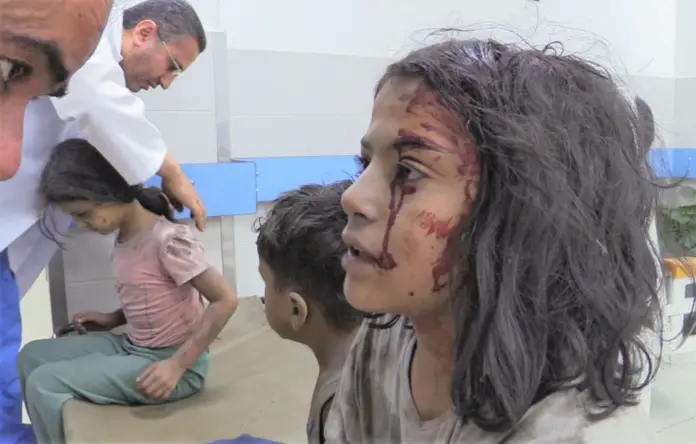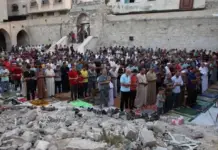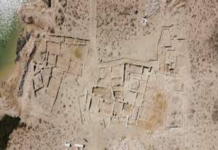Israel bombed the Gaza Strip, including Rafah, on Saturday, a day after the top UN court ordered it to halt military operations in the southern city as efforts are underway in Paris to seek a ceasefire in the war sparked by Hamas’s October 7 attack.
The International Court of Justice (ICJ) also demanded the immediate release of all hostages held by Palestinian militants, hours after the Israeli military announced that troops had recovered the bodies of three more captives from northern Gaza.
The Hague-based court, whose orders are legally binding but lack direct enforcement mechanisms, also ordered Israel to keep open the Rafah crossing between Egypt and Gaza, which had been closed earlier this month at the start of its assault on the city. Israel indicated no intention of changing its stance on Rafah, insisting the court’s decision was incorrect.
“Israel has not and will not carry out military operations in the Rafah area that create living conditions that could cause the destruction of the Palestinian civilian population, in whole or in part,” said National Security Adviser Tzachi Hanegbi in a joint statement with Israel’s foreign ministry spokesman.
Hamas, which has ruled Gaza since 2007, welcomed the ICJ ruling on Rafah but criticized the decision to exclude the rest of Gaza from the order.
Hours after the ICJ ruling, Israel continued its strikes on the Gaza Strip, with Palestinian witnesses and AFP teams reporting Israeli strikes in Rafah and the central city of Deir Al-Balah.
“We hope that the court’s decision will pressure Israel to end this war of extermination because there is nothing left here,” said Oum Mohammad Al-Ashqa, a Palestinian woman from Gaza City displaced to Deir Al-Balah by the war. Mohammed Saleh, another resident of central Gaza, expressed skepticism, saying, “Israel considers itself above the law. Therefore, I do not believe that the shooting or the war will stop other than by force.”
In its ruling, the ICJ ordered Israel to “immediately halt its military offensive, and any other action in the Rafah Governorate, which may inflict on the Palestinian group in Gaza conditions of life that could bring about its physical destruction in whole or in part.” The court also called for the opening of the Rafah crossing for humanitarian aid and the “immediate and unconditional release” of the hostages held by Hamas in Gaza.
The Gaza conflict began after Hamas’s October 7 attack, resulting in the deaths of more than 1,170 people, mostly civilians, according to an AFP tally based on Israeli official figures. Militants also took 252 hostages, 121 of whom remain in Gaza, including 37 whom the army says are dead. Israel’s retaliatory offensive has killed at least 35,800 people in Gaza, mostly women and children, according to the Hamas-run territory’s health ministry.
The Israeli military stated that the three hostages whose bodies were recovered in north Gaza on Friday — Israeli hostage Chanan Yablonka, Brazilian-Israeli Michel Nisenbaum, and French-Mexican Orion Hernandez Radoux — were “murdered” during the October 7 attack, and their bodies taken to Gaza.
The ICJ order comes as separate meetings on the Gaza conflict take place in Paris between the CIA chief and Israeli representatives on one side and French President Emmanuel Macron and the foreign ministers of four key Arab states on the other. Ceasefire talks involving US, Egyptian, and Qatari mediators ended shortly after Israel launched the Rafah operation, although Prime Minister Benjamin Netanyahu’s office stated this week that the war cabinet had asked the Israeli delegation “to continue negotiations for the return of the hostages.”
CIA chief Bill Burns was expected to meet Israeli representatives in Paris to relaunch negotiations, a Western source close to the issue said. Separately, French President Emmanuel Macron received the prime minister of Qatar and the Saudi, Egyptian, and Jordanian foreign ministers on Friday “to press for a ceasefire,” according to Cairo. The French presidency stated they held talks on the Gaza war and ways to establish a Palestinian state alongside Israel, discussing the “effective implementation of the two-state solution.”
Top US diplomat Antony Blinken also spoke with Israeli war cabinet minister Benny Gantz about new efforts to achieve a ceasefire and reopen the Rafah border crossing as soon as possible, according to Washington.
Israeli ground troops began moving into Rafah in early May, defying global opposition. Troops took over the Palestinian side of the Rafah border crossing with Egypt, further slowing sporadic deliveries of aid for Gaza’s 2.4 million people. However, on Friday, Egyptian President Abdel Fattah El-Sisi agreed in a call with US President Joe Biden to allow UN aid through the other entry point into southern Gaza, the Kerem Shalom crossing from Israel, the White House said.
The US military has also installed a temporary jetty on the Gaza coast to receive aid by sea, with a UN spokesman stating that 97 trucks of aid had been delivered after “a rocky start” a week ago.
The security and humanitarian situation in the territory remains dire, with a risk of famine, hospitals out of service, and around 800,000 people, according to the United Nations, having fled Rafah in the last two weeks. UN humanitarian chief Martin Griffiths said the situation had reached “a moment of clarity,” emphasizing the need for safety for aid workers and UN staff.
“At a time when the people of Gaza are staring down famine… it is more critical than ever to heed the calls made over the last seven months: Release the hostages. Agree to a ceasefire. End this nightmare.” Griffiths posted on social media late Friday.






